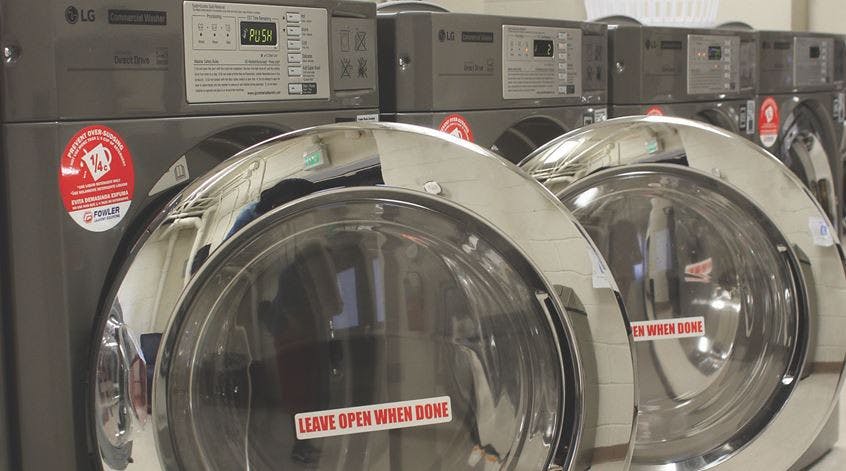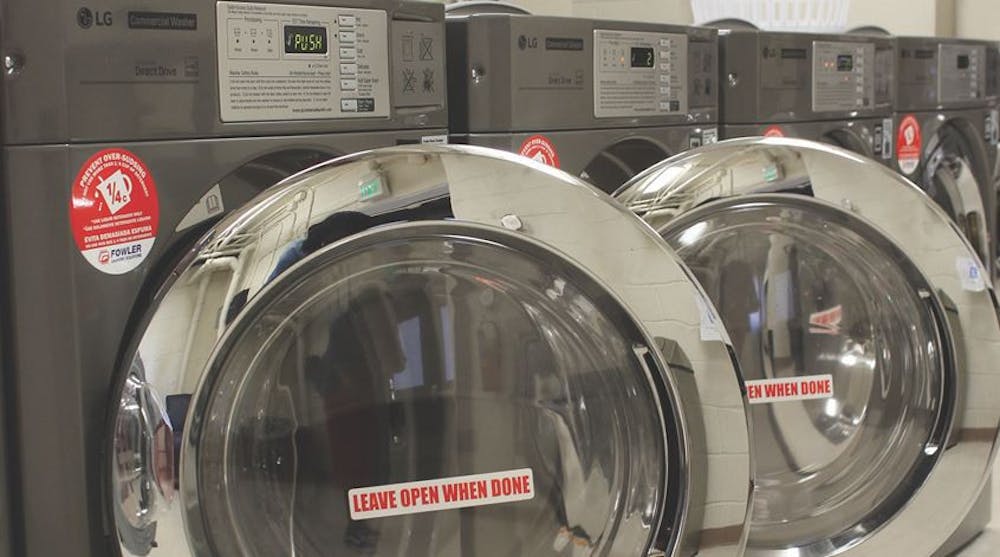Housing and Residence Life (HRL) has officially upgraded all laundry rooms on campus.
The rooms are equipped with new, high-efficiency washer and dryer machines. Residents are no longer required to pay per load.
In January, The Setonian reported that Student Government Association President Rishi Shah announced in a report last fall that free laundry “would be important to students as they would no longer have to accumulate massive loads of laundry to put all in one load. This would in turn allow students to freely do smaller loads resulting in less damage to machines and cleaner clothes.”

Laundry rooms on campus were upgraded with LG Giant C+ Platinum washer and dryer machines.
Jessica Proano, associate director of residential education and student development, said HRL is excited to provide this new, easier laundry system to students. “You walk in, you press start and it (the laundry machine) goes,” Proano said. “That’s it.”
She explained that a student can go into the laundry room, place a detergent pod inside the drum or detergent liquid inside the dispenser, select the cycle, and press “start.”
Under HRL’s previous contract with CSC ServiceWorks, students were required to pay $1.25 per load for both the washer and dryer, totaling up to $2.50 per load of laundry using Pirate’s Gold. Now, under the new contract with Fowler Laundry Companies, students are no longer required to swipe their campus ID into a touch-screen computer before operating the machines.
The machines, which are both LG Giant C+ Platinum models, now come with several new features. Students can select either hot, warm or cold washes in addition to delicates and “super wash” options. The dryers operate with high, medium or low temperatures or with no heat.
Proano said students can also file a service request on malfunctioning machines by scanning the QR codes on a poster in the laundry
rooms, downloading the service app, scanning the barcodes on the machines and filling out information. She added that students should also report problems to their housing directors.
Anam Aziz, a sophomore public relations major who lives in Xavier Hall, said the new laundry system is a lot more efficient for those who live nearby, especially since she used to go home and do laundry every weekend to save money.
“I think it’s pretty nice that laundry is free because a lot of people can’t afford to put that extra money on their campus card,” Aziz said. “It’s financially efficient and more convenient for students.”
Proano said residents are required to pay a fee of $25 per semester in their housing bills, totaling up to $50 of laundry for the academic year. But some students have complained that the free laundry is one of the causes of the increased tuition rate this year.
Others, like Aleksandra Golda, a sophomore management and marketing major, say that free laundry is nothing to complain about and that there are other factors for the tuition increase.
“I am aware that there are many students who don’t appreciate the free laundry because it caused a tuition increase,” Golda said. “But they don’t realize that the tuition increase was not just because of laundry, but because of other factors that are included in residential life, like the cafeteria renovations.” In July, the Office of the Provost announced in an email the tuition increase for the 2019-2020 academic year in its 2020 Fiscal Year Budget Book Rate Sheet. According to the document, “the proposed increase for all rooms is 3% + $25 for unlimited laundry.” The document does not describe what is specifically included in the cost of housing.
“Every decision that Housing and Residence life makes is ultimately for the overall experience of the residential student in some capacity, whether it be safety, well-being, health or entertainment,” Proano said. “Whatever it is, we try to think of what the students’ best outcome is. We want this to have a positive impact on the residential population. There’s also something to be said for being able to kind of have what your friends in other institutions might have.”
She continued, “Laundry is such a basic human necessity. You need clean clothes. I wonder how many students were being able to thrive with that because it’s something they couldn’t afford. I think it’s something that’s important. A lot of it goes down back to the University’s mission of human dignity.”
Liam Oakes can be reached at liam.oakes@student.shu.edu. Find him on Twitter @lm_oakes.





